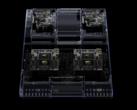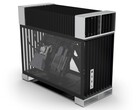The current desktop GPU generations from Nvidia and AMD are something of a mixed bag. Performance uplift over the previous generation is clearly there, especially looking at the higher-end models, but the value seems to be distorted from all the price jacking that happened during the pandemic. One other aspect that had gamers worried with the previous gen solutions was the escalating power requirements. Nvidia really pushed the envelope in this sense, as Ampere was produced on the less efficient 8 nm nodes from Samsung, yet AMD was not that far behind. However, now that both teams have made the jump to more efficient noides for the latest gaming GPU solutions, the situation is seeing quite the reversal. Team Red appears to be losing on the power efficiency front, while Nvidia surprises with relatively low power draws.
Youtuber Optimum Tech compared the Radeon RX 7900 XTX with the RTX 4080 since they are virtually neck and neck in raster performance with no superresolution shenanigans. Admittedly, the AMD card has more VRAM and a more attractive price, but, unfortunately, Team Red still has not managed to fix the power efficiency issues that have been plaguing the high-end RDNA 3 cards since launch. This is most likely a driver issue, and AMD is known for a rather disappointing track record in this regard.
Analyzing the average power draw from the wall in Doom Eternal, Optimum Tech recorded a 100 W difference between the RTX 4080 and the RX 7900 XTX with best settings, ray tracing and 4K resolution. Still, this is not the biggest difference. Testing with less demanding games like F1 22, Overwatch 2 and Apex Legends, Optimum Tech noticed that the wattage gap is getting wider. F1 22 is showing a 148 W difference, Apex Legends with 300 fps frame cap shows 111 W and Overwatch 2 shows a whooping 215 W difference. Even CS:GO, which runs on the 20-year old Source engine, is prompting the AMD card to draw 213 W, while the RTX 4080 draws only 86 W.
To measure the power draw more accurately, Optimum Tech also employed a PCAT card that measures the wattage directly from the GPU power cable and the PCIe slot. With this setup and both cards rendering about the same number of fps, somehow the AMD card is still pulling 213 W, whereas the Nvidia card is down to 65 W. In this case, performance per watt appears to be more than 3x higher in Nvidia’s favor, and GPU usage is double on the AMD card.
As the power draw is lower on the Nvidia side, the RTX 4080 is most of the times 10° C cooler and the fans tend to kick in later or do not even need to start spinning in less demanding games, plus coil whine is more noticeable on the AMD cards.
Of course, there is also the RTX 4090 card, but this is a different beast entirely, especially when we factor in the melting power connectors. Nevertheless, AMD does not have a competitor in that performance range for now. Hopefully Team Red can solve the power issues and eventually deliver a worthy RTX 4090 competitor with the RDNA 3.5 generation that is rumored to launch next year. Also, maybe release FSR 3 with frame generation this year.
Buy the Powercolor Radeon RX 7900 XTX Hellhound card on Amazon




































